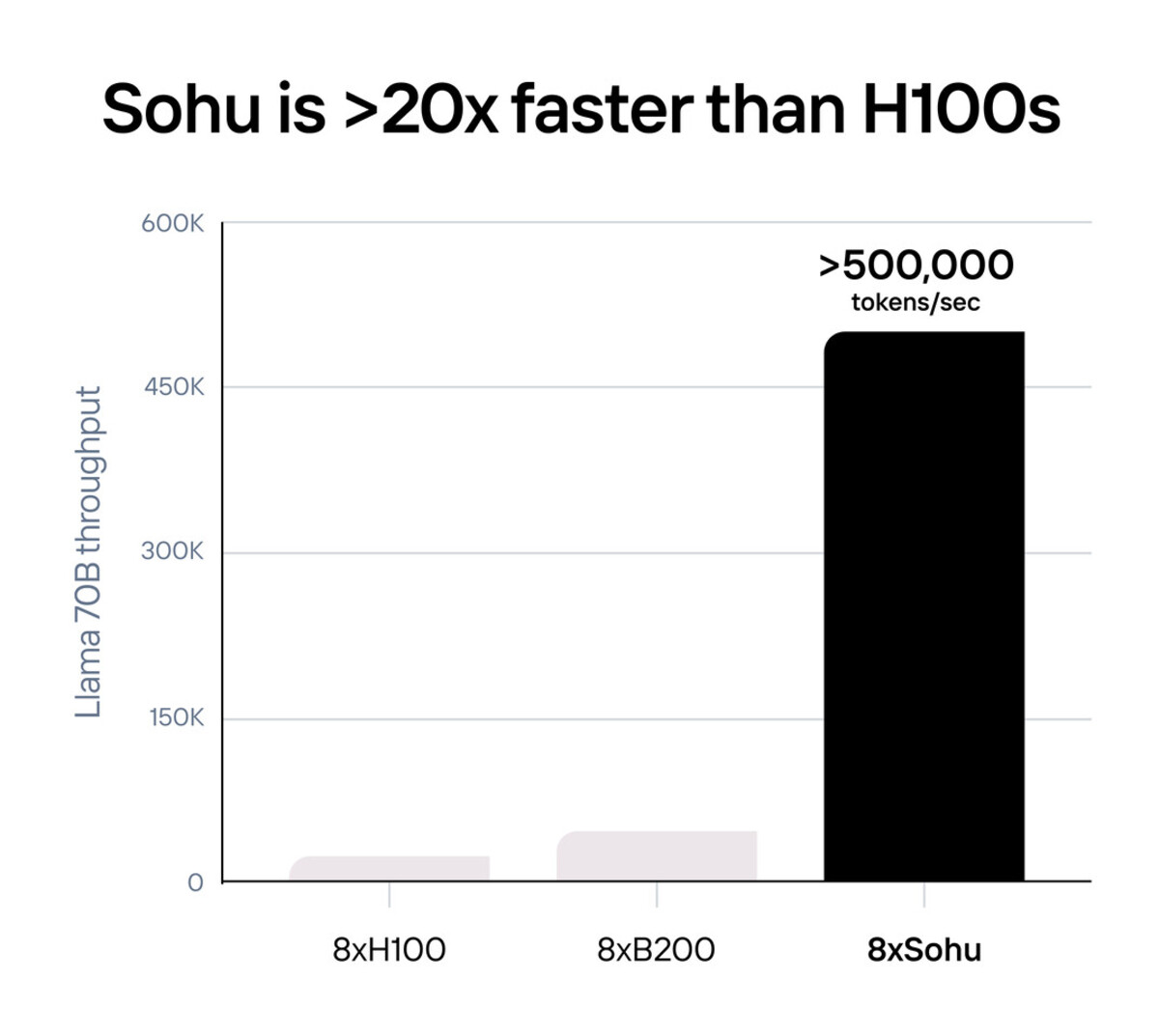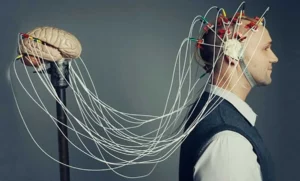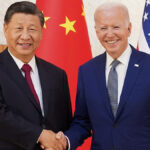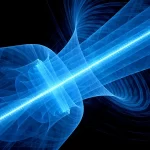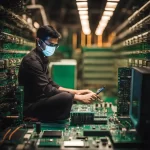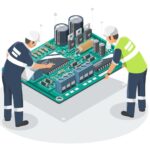Introduction
AI chip maker Etched.ai has secured $120 million in funding to challenge Nvidia’s market dominance. The company has developed a chip specifically designed for transformer models, a type of neural network architecture widely used in natural language processing and other applications.

Founded in 2022 by CEO Gavin Uberti and Harvard University teaching fellow Chris Zhu, Etched.ai is set to revolutionize the AI hardware market with its transformer-only ASIC named Sohu.
This innovative chip is engineered to run transformer models at speeds 20 times faster than Nvidia’s H100 GPUs, marking a potential seismic shift in the AI hardware landscape.
This is a significant development in the AI chip market, as it suggests that there is a growing demand for specialized hardware for AI workloads. Etched.ai is betting on the continued popularity of transformer models, and if their gamble pays off, they could become a major player in the AI chip market.
It will be interesting to see how this plays out in the coming years. If transformer models remain the dominant architecture for AI workloads, then Etched.ai could be well-positioned for success. However, if there is a shift to a new architecture, then the company could be left behind.
Follow us on Linkedin for everything around Semiconductors & AI
The Birth of Sohu: A Transformer-Only ASIC from Etched.ai
Etched.ai’s Sohu chip is designed specifically for transformer models. These models power advanced AI applications like ChatGPT, Google’s Gemini, and Stable Diffusion 3. Unlike traditional GPUs, which run various AI models such as CNNs, RNNs, and LSTMs, Sohu focuses solely on transformers. This specialization makes Sohu faster and more efficient for transformer-based software.
Google researchers introduced the transformer model in 2017. It processes input data while understanding context and relationships within the data. The model uses a mechanism called ‘attention’ or ‘self-attention.’ This allows the model to focus on different parts of the input data and understand how each part influences the others.
A Calculated Bet on Transformers by Etched.ai
While the Sohu chip’s specialization provides unmatched performance for transformer models, it comes with the limitation of being unable to execute other types of AI models. Etched.ai acknowledges this trade-off but argues that the dominance of transformer-based models in current AI applications justifies their focused approach.
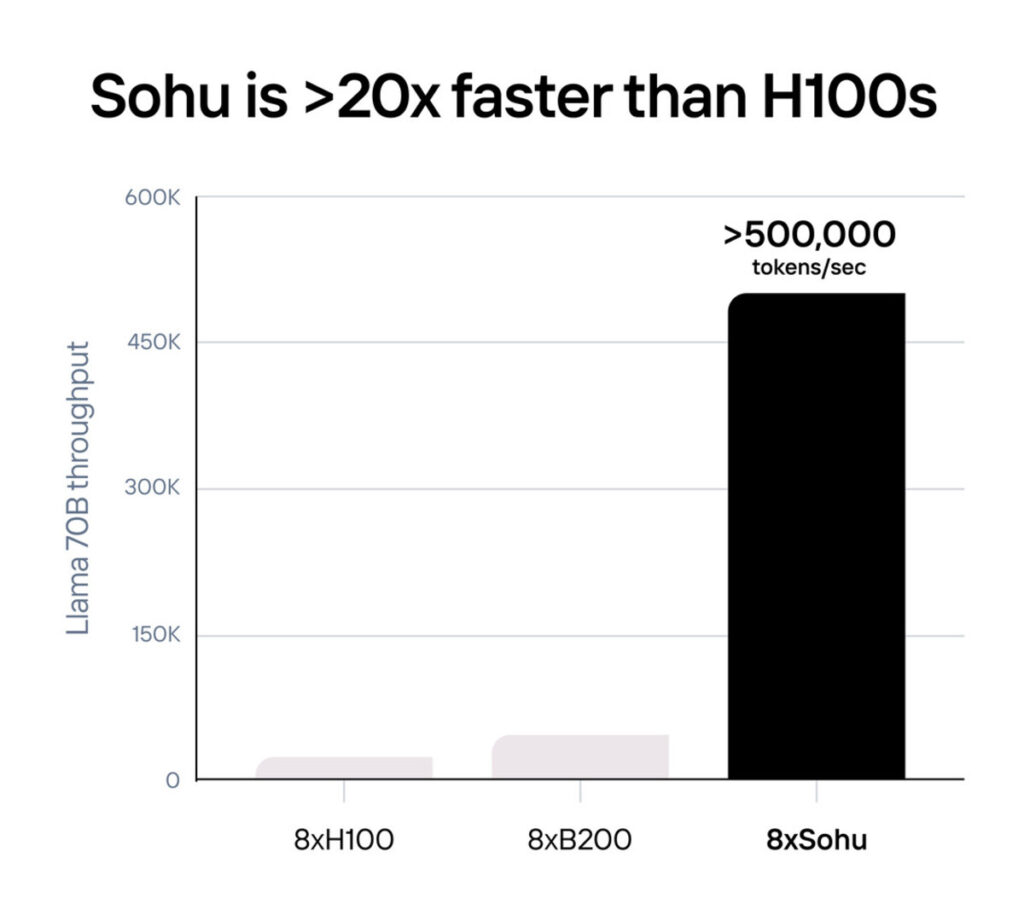
As CEO Gavin Uberti put it, “If transformers go away, we’ll die. But if they stick around, we’re the biggest company of all time.”
The company’s confidence is rooted in the growing prevalence of transformer models in the AI landscape. From large language models like ChatGPT and Google’s Gemini to advanced image generation models like Stable Diffusion 3, transformers are at the core of today’s most advanced AI technologies. Etched.ai is betting that this trend will continue, making their specialized hardware increasingly valuable.
This is a big deal for a few reasons:
Challenge to Nvidia’s dominance: Nvidia is currently the leading player in the AI chip market. Etched.ai’s success could shake things up and create more competition, potentially leading to better AI chips for everyone.
Focus on transformer models: Transformers are a powerful type of AI architecture with a wide range of applications. By specializing in this area, Etched.ai could offer chips that are more efficient and powerful for specific tasks compared to Nvidia’s more general-purpose offerings.
Signifies growth in the AI chip market: The fact that Etched.ai is able to raise $120 million shows that there’s a growing demand for specialized AI hardware. This investment could fuel further innovation in the field.
Potential for even faster AI development: More efficient AI chips could accelerate the development of AI applications in various fields, from healthcare and finance to self-driving cars and natural language processing.
However, there are also some risks involved:
- Uncertainty about future AI architectures: If a new architecture becomes dominant, Etched.ai’s focus on transformers could become a disadvantage.
- Success depends on chip performance: The actual performance of Etched.ai’s chip will be crucial for its success. It needs to be demonstrably better than existing options for transformer-based tasks.
Overall, this is a significant development with the potential to reshape the AI chip landscape. It will be interesting to see how Etched.ai performs and how Nvidia responds to this new competitor.
Superior Performance Through Specialization
One of the key advantages of the Sohu chip is its optimization for a single algorithm. By focusing exclusively on transformer inference, the chip eliminates much of the control flow logic required by more general-purpose GPUs. This allows for a higher density of mathematical computation blocks, resulting in a reported 90 percent FLOPS utilization compared to around 30 percent for GPUs running transformer software.
This level of optimization means that Sohu can deliver performance that is not just incrementally better but orders of magnitude faster than existing GPU solutions. In an industry where training advanced AI models can cost upwards of $1 billion, such performance improvements are not just beneficial—they are essential.
Read More: 6 Reasons Why Nvidia Overtook Apple as World’s Second Most Valuable Company – techovedas
Funding and Future Prospects
Etched.ai will use the $120 million raised in the Series A round to tape-out the Sohu ASIC and start manufacturing with TSMC.
Although the specific manufacturing process node remains undisclosed, the funding will help Etched.ai bring their innovative chip to market and challenge established players like Nvidia.
Etched.ai’s journey is reminiscent of the transition that occurred in the cryptocurrency mining industry, where specialized ASICs replaced GPUs due to their superior efficiency.
Similarly, Etched.ai believes that specialized AI chips like Sohu will eventually supplant GPUs in many AI applications, particularly those dominated by transformer models.
Read More: The $160 Billion What-If: SoftBank Blunder with NVIDIA – techovedas
Implications for the AI Hardware Market
Etched.ai’s focus on transformers reflects a broader trend towards specialization in AI hardware.
The company believes that as AI models grow more complex and resource-intensive, there will be an increasing demand for dedicated hardware optimized for specific tasks.
This mirrors historical shifts in other tech sectors, such as the move from general-purpose CPUs to GPUs for graphics and later to ASICs for cryptocurrency mining.
If successful, Etched.ai’s Sohu chip could significantly disrupt the AI hardware market, offering a new paradigm for efficiency and performance.
It could also drive further innovation as other companies may follow suit, developing their own specialized chips to address different aspects of AI and machine learning.
Nvidia Vs Etched.AI
Here’s the key difference between Nvidia GPUs and Etched.ai’s chip (likely called Sohu):
Focus:
- Nvidia GPUs: General-purpose. They can handle a wide variety of tasks including gaming, video editing, scientific computing, and some AI applications. They are designed to be flexible and adaptable.
- Etched.ai Chip (Sohu): Specialized. It is optimized specifically to run transformer models, which are a type of neural network architecture used in natural language processing and other AI tasks.
Efficiency:
- Nvidia GPUs: Because they are general-purpose, they may not be the most efficient for specific tasks like running transformer models. They might use more power and resources for these tasks compared to a specialized chip.
- Etched.ai Chip (Sohu): Etched claims its design, built specifically for transformer models, can significantly increase speed and reduce power consumption compared to Nvidia GPUs for these specific tasks.
Cost:
- Nvidia GPUs: There’s a range of prices depending on the model and performance.
- Etched.ai Chip (Sohu): Pricing information isn’t publicly available yet. However, considering it’s a new and specialized chip, it might be more expensive than some Nvidia GPUs initially.
Applications:
- Nvidia GPUs: Used in various fields like gaming, video editing, scientific computing, and some AI applications.
- Etched.ai Chip (Sohu): Primarily suited for tasks that heavily rely on transformer models, such as natural language processing (chatbots, machine translation), text summarization, and some scientific computing tasks.
Summary:
- Nvidia GPUs offer flexibility for various tasks, but may not be the most efficient for specific AI workloads.
- Etched.ai’s chip is a challenger, aiming for superior speed and power efficiency for transformer model tasks, but might not be as versatile for other uses.
The choice between them depends on your specific needs. If you need a powerful chip specifically for transformer models, Etched’s offering could be a good option.
Conclusion
Etched.ai’s ambitious entry into the AI hardware market with its transformer-only ASIC represents a significant leap forward in the field of AI computing. By focusing on the most advanced and prevalent AI models, Etched.ai is positioning itself to potentially disrupt the market and set new standards for performance and efficiency.
If transformers maintain their central role in AI, Etched.ai could indeed become a dominant player in the hardware landscape, paving the way for a new era of specialized AI processoomprehensive overview of Etched.ai’s new ASIC, Sohu, its potential impact on the AI hardware market, and the strategic thinking behind its development. It highlights the company’s calculated bet on transformer models and the technological advantages of specialization, offering readers valuable insights into the future of AI computing.

